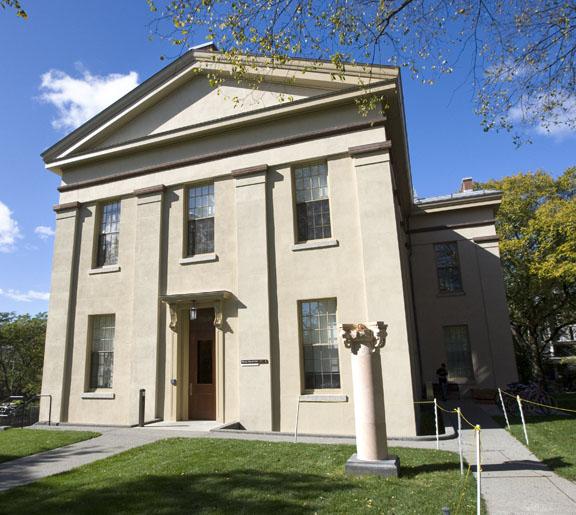PROVIDENCE, R.I. [Brown University] — Brown University will rededicate historic Rhode Island Hall as the new home of the Artemis A.W. and Martha Sharp Joukowsky Institute for Archaeology and the Ancient World on Friday, Oct. 16, 2009. The ceremony will include remarks by Brown President Ruth J. Simmons; Chancellor Thomas J. Tisch, Chancellor Emeritus Artemis A. W. Joukowsky; Susan Alcock, director of Joukowsky Institute; Prince Zeid Ra’ad Zeid Al-Hussein, ambassador of the Hashemite Kingdom of Jordan to the United States; and James Wiseman, the Founder’s Professor of Archaeology and professor of art history and classics at Boston University.
“In its new permanent home on The College Green, the Joukowsky Institute of Archaeology and the Ancient World is a testament to the University’s commitment to multidisciplinary research and teaching on the material cultures of the ancient world,” said Artemis A.W. Joukowsky, Brown’s chancellor emeritus. “We are thrilled with the Institute’s potential as a major contributor to the highest levels of scholarship consistent with Brown’s status as a pre-eminent university.” Joukowsky and his wife Martha Sharp Joukowsky, former director of the Center for Old World Archaeology and Art, are longtime champions of archaeology at Brown and have led the University’s excavations at Petra in Jordan.
Rhode Island Hall, the fourth-oldest building on The College Green, has just undergone a $12-million renovation, led by Anmahian Winton Architects of Cambridge, Mass., with Nick Winton, a 1985 Brown graduate, as the principal designer. When the Joukowsky Institute for Archaeology and the Ancient World was established in 2004 under the Plan for Academic Enrichment, Rhode Island Hall was assigned as the Institute’s new home.
In need of major renovation, the 170-year-old building has been emptied and completely renovated to include classroom, laboratory, studio, and communal spaces, and designed to provide a welcoming and stimulating environment for scholarship and community. The building’s energy efficiency and high-performance design also meet the standards for silver LEED certification by the U.S. Green Building Council.
Additionally, various features of the building combine past and present. Several pieces of furniture in the building were crafted by Bilt Furniture of Providence, a company recently founded by four Brown graduates, using salvaged pieces of the hall’s original 19th-century timbers. In addition to several artifact display cases scattered throughout the building, the design also features a view into the building’s history — a glass-covered interior wall revealing Rhode Island Hall’s original fieldstone rubble. An elephant-headed column capital, a gift from Michael W. Joukowsky, Class of 1987, now stands outside the building on The College Green. The piece, sculpted by Dakhilallah Qublan, is a three-quarters replica of one of the original 142 column capitals discovered at the Great Temple Excavation in Petra.
The Rhode Island Hall project is just one of Brown’s recent efforts to preserve the University’s significant historical buildings through renovation and restoration. In recent years, the University has completed renovation projects to repurpose existing buildings, including the Peter Green House, Pembroke Hall, Smith-Buonanno Hall, and J. Walter Wilson Laboratory. Faunce House is currently under renovation to create the Stephen Robert ’62 Campus Center.
History of Rhode Island Hall
The building has seen a variety of occupants since its construction in 1840. Funding for the building, which originally housed the Departments of Natural Philosophy, Chemistry, Mineralogy, Geology, and Natural History, came largely through gifts from Rhode Island benefactors, suggesting its original the name. According to the Encyclopedia Brunoniana, it was opened for public inspection on Sept. 3, 1840, and dedicated on the following day.
The science departments had an extensive collection of taxidermy and osteological specimens, which were displayed in the Museum of Natural History, located on the second floor of Rhode Island Hall. The building continued to be occupied by biology until 1915 and by the Department of Geological Sciences until 1982. That year, with its classrooms and laboratories deemed insufficient for modern scientific disciplines, the building was converted for use as multipurpose space. Until fall 2008, Rhode Island Hall housed the Office of International Programs, the Writing Fellows Center, the Wayland Collegium for Liberal Learning, and Psychological Services.
The Joukowsky Institute for Archaeology and the Ancient World
The Joukowsky Institute for Archaeology and the Ancient World is dedicated to the academic study and public promotion of the archaeology and art of the ancient Mediterranean, Egypt, and Western Asia. The institute’s faculty and facilities provide a campus hub for research and teaching in this complex and compelling part of the world, including active fieldwork projects, diverse graduate and undergraduate curricula, and public outreach activities.

